Faculty Grants and Fellowships
Academic Year 2024-25
Stephanie McNulty, The Honorable & Mrs. John C. Kunkel Professor of Government

Dr. McNulty received $384,323 from the National Science Foundation for a project titled Participation in the City: How Urban Participatory Innovations are Reshaping Democracy, Governance and Trust.
Abstract
In an era of eroding freedoms and withering trust in electoral democracy, innovations in political participation are pivotal to democracy’s survival in the 21st century. Cities have been a key source of urban participatory innovations (UPIs) that offer new practices through which citizens can inform and reshape democracy. Through the lens of these innovations, PAR-CITY will work towards three objectives: 1) establish the empirical significance of cities for responding to the global challenges of democracy, governance and trust (DGT); 2) examine the role of digital tools and technologies in eroding or strengthening DGT in large cities; and 3) advance concepts, models and theories that allow us to better understand how urban spaces are building trust and reshaping democracy through participatory innovations. The project, funded by the Trans-Atlantic Platform for Social Sciences and Humanities, brings together an interdisciplinary team of 25 researchers who will compare 7 major cities (covering 4 regions across the global south and north) to examine how cities and their UPIs respond to the key democratic challenges of our times. The National Science Foundation will fund a team of four experts from the United States who will document and analyze the participatory eco-system of New York City over a period of three years.
Beckley Davis, Professor of Biology
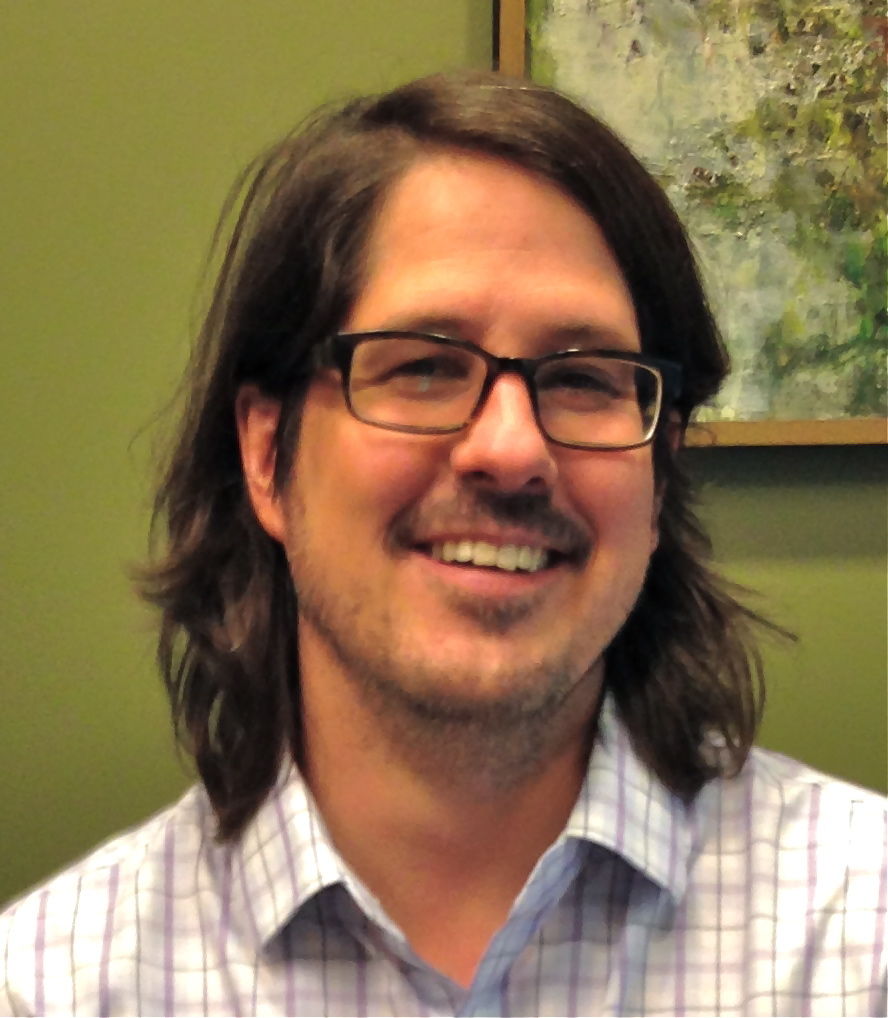
Dr. Davis received $384,940 from the National Institutes of Health for a project titled Regulation of pathogen sensing and inflammation by NLR proteins.
Willie Wilson, Assistant Professor of Computer Science
Dr. Wilson received an NSF CAREER Award.
The goal of this project is to develop Theory of Mind (ToM) algorithms, which will allow social robots to infer a child’s goals, intentions, and beliefs, and provide new and better learning opportunities in the classroom. ToM algorithms use analogical reasoning to make inferences, providing transparency and explainability in the robot’s reasoning. The hope is that children and parents will see the robot as effective, helpful, and trustworthy. While the proximate goals are to suggest how robots can contribute to learning and address a broad need for a critical understanding of the ethical use of robots, the technical aspects of the work will result in improved ToM algorithms, novel applications of analogical chaining, and unique datasets featuring complex theory of mind scenarios. More information on Dr. Wilson's award can be found here.
The goal of this project is to develop Theory of Mind (ToM) algorithms, which will allow social robots to infer a child’s goals, intentions, and beliefs, and provide new and better learning opportunities in the classroom. ToM algorithms use analogical reasoning to make inferences, providing transparency and explainability in the robot’s reasoning. The hope is that children and parents will see the robot as effective, helpful, and trustworthy. While the proximate goals are to suggest how robots can contribute to learning and address a broad need for a critical understanding of the ethical use of robots, the technical aspects of the work will result in improved ToM algorithms, novel applications of analogical chaining, and unique datasets featuring complex theory of mind scenarios. More information on Dr. Wilson's award can be found here.
Scott Lerner, Arthur and Katherine Shadek Professor of Humanities and French and Italian
Dr. Scott Lerner, Chair of the Department of Italian and Hebrew, received 20,000 Euros
from the Italian Ministry of Foreign Affairs. This was the third time the Department
has received this competitive award. The funds are used to help support a teaching
fellow at the College.
Chesapeake Watershed Initiative
The Chesapeake Watershed Initiative (CWI), led by Patrick Fleming, (Associate Professor
of Economics), Dorothy Merritts (Harry W. & Mary B. Huffnagle Professor of Geosciences),
Robert Walter (Dr. Earl D. Stage & Mary E. Stage Professor of Geosciences) and Christopher
Williams (Professor of Environmental Science), were awarded $937,496 from the Richard
King Mellon Foundation.
These funds will support the CWI's ongoing program of research and public outreach focused on building a deep understanding of the legacies of human impacts on riparian-aquatic ecosystems, and of transformative restoration efforts, to improve water quality and ecosystem health in the Chesapeake Bay Watershed. The CWI’s approach of connecting landscape history and trajectories to current place-based restoration is uniquely valuable and applicable to a wide range of human-impacted geographies across the globe.
The work of the CWI focuses on three pillars: interdisciplinary research, education through close collaboration with students, and publicly-engaged action. Building on prior support from the Richard King Mellon and Steinman foundations, the CWI will map and characterize the legacy of human impacts on streams and valley bottoms in the mid-Atlantic region; explore the utility of science-based visualization strategies to foster willingness and stakeholder engagement among both policymakers and landowners; and generate and test hypotheses related to the ecological and economic benefits of place-based restoration strategies.
These funds will support the CWI's ongoing program of research and public outreach focused on building a deep understanding of the legacies of human impacts on riparian-aquatic ecosystems, and of transformative restoration efforts, to improve water quality and ecosystem health in the Chesapeake Bay Watershed. The CWI’s approach of connecting landscape history and trajectories to current place-based restoration is uniquely valuable and applicable to a wide range of human-impacted geographies across the globe.
The work of the CWI focuses on three pillars: interdisciplinary research, education through close collaboration with students, and publicly-engaged action. Building on prior support from the Richard King Mellon and Steinman foundations, the CWI will map and characterize the legacy of human impacts on streams and valley bottoms in the mid-Atlantic region; explore the utility of science-based visualization strategies to foster willingness and stakeholder engagement among both policymakers and landowners; and generate and test hypotheses related to the ecological and economic benefits of place-based restoration strategies.
F&M Information Technology Services
A group led by Carrie Rampp, Information Technology Services (ITS) and including Jason
Brooks (Research Computing/ITS) Jaime Blair (Biology), Justin Brody (Computer Science),
and Dorothy Merrits (Earth and Environmental Science) was awarded $460,452 by the
National Science Foundation to expand the College's research computing infrastructure.
The funds will be used to expand research data storage capacity by adding 2.14 petabytes*
of usable capacity to F&M systems allowing the College to better meet the needs of
researchers and their students to support scientific research and discovery. F&M researchers
are generating increasing amounts of data through field work, experimentation and/or
analysis work, requiring a centralized repository for new and existing data that may
not be otherwise easily accessible or reproducible. F&M is a leader amongst small
colleges showcasing how it is possible to design and implement significant research
infrastructure that advances scientific discovery. The expanded research storage will
allow F&M researchers to collaborate with other researchers around the globe and provide
greater access to the national fabric of scientific research infrastructure and sharing
of storage and computing power via the Open Science Network (OSN), Open Science Grid
(OSG), NSF's ACCESS program and Globus.
*To help put this is perspective, this equivalent to the storage capacity of more than 20,000 average laptops or 2 billion photos, 163 years worth of video or 750 million e-books.
*To help put this is perspective, this equivalent to the storage capacity of more than 20,000 average laptops or 2 billion photos, 163 years worth of video or 750 million e-books.
Louise LoBello, Digital & Special Collections Librarian
Louise received $4,000 to participate in the M. C. Lang Fellowship in Book History,
Bibliography, and Humanities Teaching with Historical Sources. The Fellowship is offered
by the Rare Book School at the University of Virginia in Charlottesville.
As a Lang Fellow, Louise will focus on how most effectively to help undergraduates understand books as a, “coalescence of human intentions, a rich sign system whose culturally incarnated meanings are conveyed by the bibliographical and social codes present in every book..” The goal of the program is to help humanities teachers make maximal use of special collections resources in their undergraduate courses, integrating bibliographical and book-historical knowledge into teaching and learning.
As a Lang Fellow, Louise will focus on how most effectively to help undergraduates understand books as a, “coalescence of human intentions, a rich sign system whose culturally incarnated meanings are conveyed by the bibliographical and social codes present in every book..” The goal of the program is to help humanities teachers make maximal use of special collections resources in their undergraduate courses, integrating bibliographical and book-historical knowledge into teaching and learning.
Eric Hirsch, Associate Professor of Environmental Studies
Eric Hirsch, Department of Earth and Environment, received $500,00 from the Mellon
Foundation Higher Learning program for the project: The Agricultural Futures Archive: Rural and Urban Growers in the Shadow of the Solar
Panel.
Abstract
Agriculture in the US is at a crossroads. Small, non-corporate, and family growers are losing their farms at an alarming rate as costs increase, harvests decline, and factory farms expand. Climate change impacts, notably drought and heat, but also floods and fires, threaten once-reliable harvests. Meanwhile, policymakers see sun-soaked agricultural fields as a key frontier for expanding solar panel infrastructure. They are testing new ways of preserving grower livelihoods by integrating solar panels with agriculture (agrivoltaics). As climates and economies change, and technology development accelerates, grower voices are often unheard, with their situated expertise undervalued. This project amplifies their perspectives to understand this major turning point in the US food-energy system by developing a new digital archive of grower testimonies and bringing them, first, into college-level environmental humanities classrooms, and next, to active policy debates and decision making arenas. We propose to collect 500 oral history/oral future testimonies from diverse grower communities facing several possible futures in tension with one another across rural and urban Pennsylvania, a state whose policymakers are considering major investments in agrivoltaics. Our research also entails in situ ethnography, community and policymaker engagement, participatory mapping, and creative collaborations with grower artists.
Abstract
Agriculture in the US is at a crossroads. Small, non-corporate, and family growers are losing their farms at an alarming rate as costs increase, harvests decline, and factory farms expand. Climate change impacts, notably drought and heat, but also floods and fires, threaten once-reliable harvests. Meanwhile, policymakers see sun-soaked agricultural fields as a key frontier for expanding solar panel infrastructure. They are testing new ways of preserving grower livelihoods by integrating solar panels with agriculture (agrivoltaics). As climates and economies change, and technology development accelerates, grower voices are often unheard, with their situated expertise undervalued. This project amplifies their perspectives to understand this major turning point in the US food-energy system by developing a new digital archive of grower testimonies and bringing them, first, into college-level environmental humanities classrooms, and next, to active policy debates and decision making arenas. We propose to collect 500 oral history/oral future testimonies from diverse grower communities facing several possible futures in tension with one another across rural and urban Pennsylvania, a state whose policymakers are considering major investments in agrivoltaics. Our research also entails in situ ethnography, community and policymaker engagement, participatory mapping, and creative collaborations with grower artists.
Academic Year 2023-2024
John Modern, Arthur and Katherine Shadek Professor of Religious Studies

Dr. Modern was awarded a $60,000 fellowship from the National Endowment for the Humanities for a book project titled The Book of Akron: A Pre-History of Post-Industrial Society.
Abstract
In my hometown, deindustrialization was first glimpsed in bold-letter headlines from the Akron Beacon Journal announcing negotiations, union strikes, loss, or layoffs. Tire production in Akron, Ohio—the so-called “Rubber City”—was in free fall. By 1983, Goodyear, Firestone, and Goodrich—the industrial backbone of my community for over half a century—closed all of their factories. Gone over a decade were the vibrant union cultures and a half-century tradition of having produced up to two-thirds of all tires made in the U.S. The Book of Akron: A Pre-History of Post-Industrial Society uses the particularities of biography and the archive to reimagine the transition between two technological eras—from an age of colonial extraction and industrial expansion to our era of artificial intelligence. Honing in on visions of efficiency and advancements in automation across three centuries, The Book of Akron approaches the longue durée of deindustrialization against the backdrop of the machines, the science, and the automated techniques that were involved—from indigenous practices of animal procurement and the military schemes of settler colonists to early techniques of automation in the tire industry, polymer science, and the increasing (and increasingly overwhelming) presence of micro-computers and their cognitive imperatives.
View more information on Dr. Modern's book and other scholarship.
Gregory Adkins, William G. and Elizabeth R. Simeral Emeritus Professor of Physics
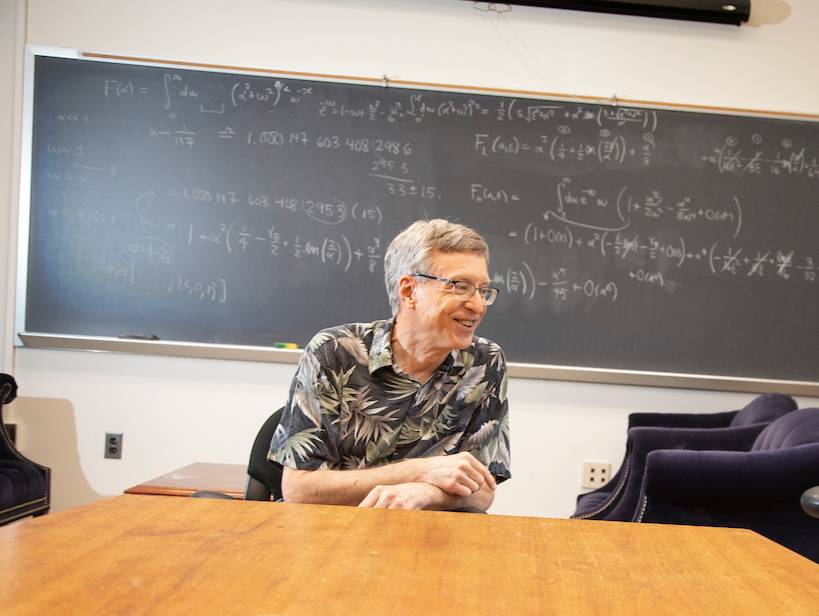
Dr. Adkins was awarded $150,000 from the National Institue of Standards for a project titled Calculation of Recoil Corrections to Muonium Hyperfine Splitting.
Abstract
Muonium is the bound state of a positive muon and an electron. The structure of muonium is determined by the Coulomb force along with Quantum Electrodynamic (QED) corrections acting between two pointlike spin-1/2 fermions. Strong interaction effects are minimal since, in contrast to the proton, the muon is point-like and has no internal structure governed by the strong interaction. Weak interaction effects are intrinsically small. Precision spectroscopy of muonium provides important information about the validity of QED; the values of fundamental constants such as the muon mass, the Rydberg constant, and the fine structure constant; and informs the search for new physics. The theoretical evaluation of the muonium ground state hyperfine splitting is in immediate need of improvement. The current theoretical value for this interval is less precise than the expected precision of the experiment being developed by the MuSEUM collaboration at J-PARC in Japan. The best use of improved experimental precision will only be realized if theory can be improved as well. The goal of the present project is to improve theory by computing the needed additional energy corrections.
Kate Plass, Professor, Department of Chemistry
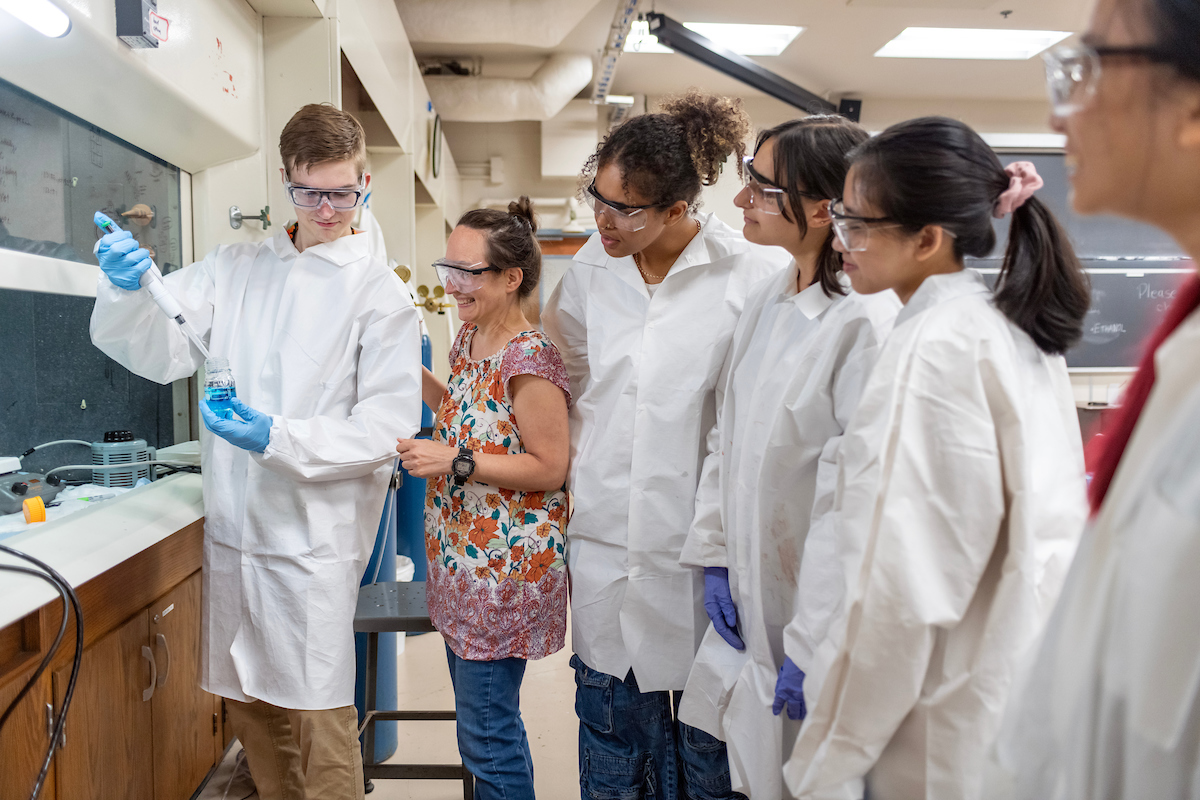
Dr. Plass received $10,000 from the Pittsburgh Conference on Analytical Chemistry and Applied Spectroscopy (PittCon) for the purchase of potentistats.
Abstract
Funding was requested for three potentiostats to be used in Chemistry and Physics laboratory courses. Potentiostats measure how electrical current travels into or out of a material. An understanding of this property is crucial to sustainable energy technologies like solar cells, batteries, and solar fuel generation. Laboratory experiences can now be developed teaching these technologies.
View more information on Dr. Plass' research and work with students.
Josh Rottman, Associate Professor of Psychology & Scientific and Philosophical Studies of Mind
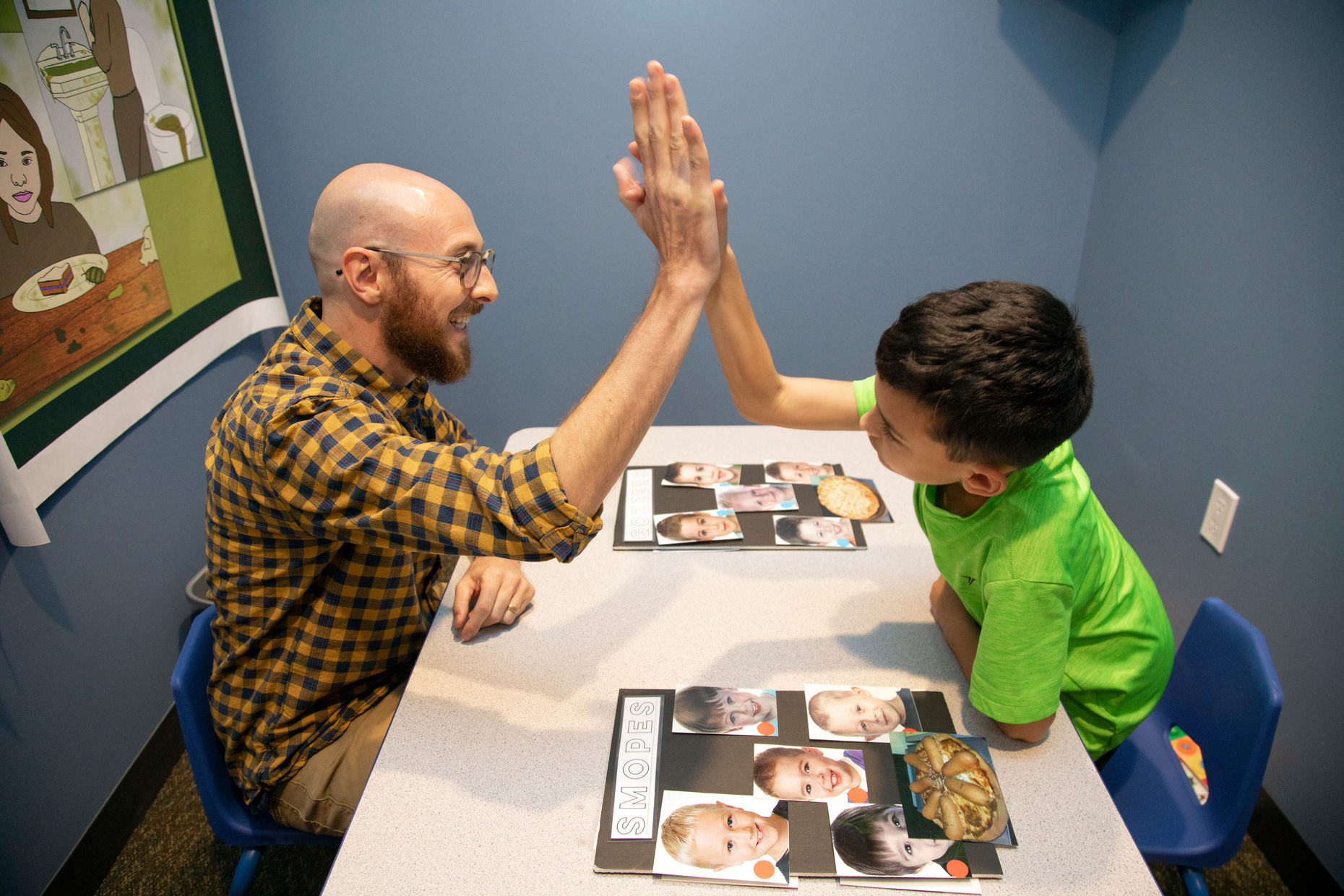
Dr. Rottman received $133,102 from the John Templeton Foundation for a project titled A Multifaceted Investigation of the Development of Intellectual Humility and its Links to Children’s Reasoning Across Domains and Contexts.
Abstract
Increased societal polarization has made it critical to understand how to foster children’s ability to navigate productive disagreement. In particular, we need better insights into the development of intellectual humility (IH)—an awareness of what one does not know (the limits of one’s knowledge) and that one could be wrong (the fallibility of one’s knowledge). In adults, greater IH is associated with decreased polarization and extremism (Bowes et al., 2020; Mellers et al., 2019), an openness to opposing viewpoints (Porter & Schumann, 2018), and greater learning (Krumrei-Mancuso et al., 2020; Porter et al., 2021). Understanding the development of this intellectual virtue across childhood can bring us one step closer to understanding how to promote it, and its benefits, among youth. This multi-site collaborative project will lay the groundwork for a developmental science of IH by developing and validating a novel self-report measure for children from 6 to 10 years of age.
Edward Fenlon, Professor of Chemistry

Dr. Fenlon, with colleagues Sarah Tasker and Davide Lionetti, was awarded $390,720 from the National Science Foundation for the project titled Acquisition of a Nuclear Magnetic Resonance (NMR) instrument for use in Research and Undergraduate Research Training.
Abstract
Franklin and Marshall College is acquiring a 400 MHz nuclear magnetic resonance (NMR) spectrometer equipped with a broadband probe to facilitate research in physical organic chemistry, structural biology, and materials science. In general, NMR spectroscopy is one of the most powerful tools available to chemists to elucidate the structure of molecules. Using the intrinsic magnetic properties of atomic nuclei, it is used to identify unknown substances, characterize specific arrangements of atoms within molecules, and study the dynamics of interactions between molecules. Access to state-of-the-art NMR spectrometers is essential for chemists carrying out frontier research. This instrument enhances the educational, research, and teaching efforts of students at all levels as well as providing accessibility for use at a nearby community college, Harrisburg Area Community College.
Berwood Yost, Director, Floyd Institute's Center for Opinion Research and Director
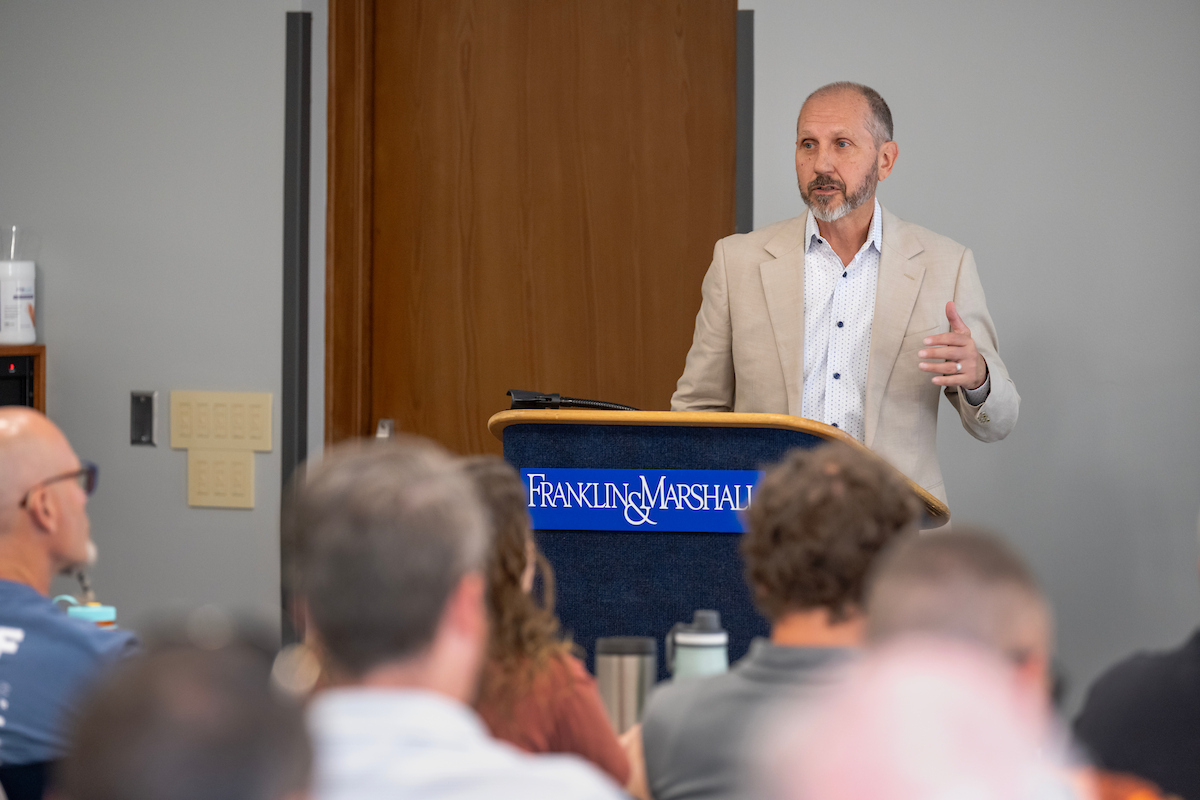
Berwood Yost received $323,169 from the National Institute of Health for a project titled Better Together: Enhancing Hispanic Health in Central Pennsylvania through Healthy Lifestyle Policies and Practices.
Abstract
Working with the REACH team from Penn State, the Center for Opinion Research will help implement and evaluate community-academic initiatives enhancing Hispanic health in Central PA. The overarching goal of this project is to provide the Hispanic communities in Berks, Dauphin, Lebanon, and York, Pennsylvania, with evidence-based tools to improve their health, prevent chronic diseases, and reduce health disparities via community-led, culturally tailored interventions. To accomplish these goals, the project team is implementing and evaluating practice- and evidence-based, community-driven interventions through policy, systems, and environmental change strategies to improve health, prevent chronic diseases, and reduce health disparities. The current project team is working to impact these Hispanic communities through healthy nutritional programming, improved physical activity opportunities, enhanced early care and education settings, and increased COVID-19, flu, and other adult vaccine rates. The project has short- and long-term process measures with associated outcome variables for each intervention strategy. Initial year one process measures broadly include 1) the provision of technical services and professional development activities, 2) gathering of community feedback via quantitative, mixed methods, 3) the identification of targeted sites for each initiative, 4) assessment of existing standards/policies, 4) cultural adaptation of activities, and 5) the delivery of targeted educational programming. The Franklin & Marshall College Center for Opinion Research assists in assessment activities and is leading the design and implementation of a baseline community health needs assessment to inform project activities and help community partners prioritize populations, settings, and programs.
Scott Brewer and Edward Fenlon, Professors of Chemistry
Profs. Fenlon and Brewer received $423,133 from the National Institue of Health for
the project titled Use of Vibrational Reporters to Measure Dynamics and Distances in RNA and Proteins.
Abstract
The objective of this research is to use vibrational reporters and infrared (IR) spectroscopy to study the structure and dynamics in two proteins, adenylate kinase (AK) and superfolder green fluorescent protein, and in RNA hairpins. If successful, the development of the proposed IR methods would be very impactful for biophysical chemistry. Mutations in AK are associated with hemolytic anemia, reticular dysgenesis, and ciliary dyskinesia. Research in to the RNA hairpins has the potential to benefit future advances in RNA vaccines, CRISPR, and RNA interference therapies.
Abstract
The objective of this research is to use vibrational reporters and infrared (IR) spectroscopy to study the structure and dynamics in two proteins, adenylate kinase (AK) and superfolder green fluorescent protein, and in RNA hairpins. If successful, the development of the proposed IR methods would be very impactful for biophysical chemistry. Mutations in AK are associated with hemolytic anemia, reticular dysgenesis, and ciliary dyskinesia. Research in to the RNA hairpins has the potential to benefit future advances in RNA vaccines, CRISPR, and RNA interference therapies.
Tim Bechtel, Senior Teaching Professor of Geosciences
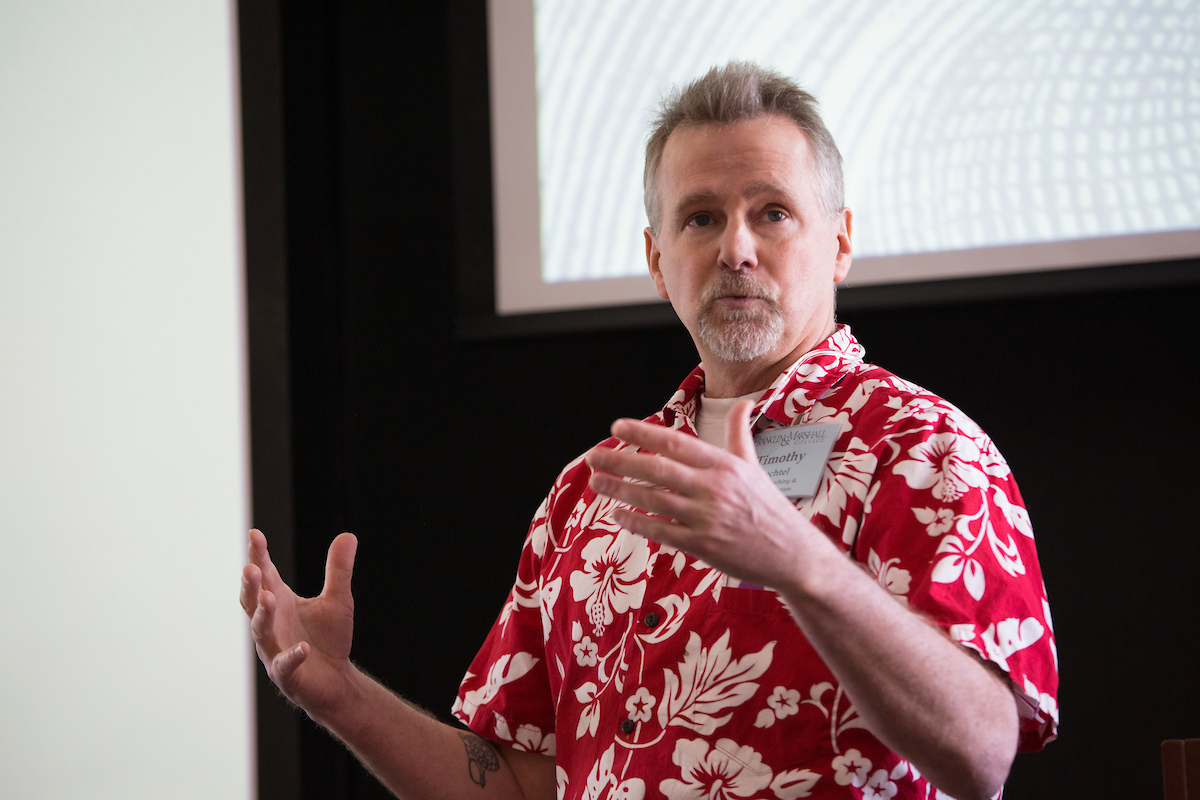
Dr. Bechtel received $135,534 from the NATO Science for Peace and Security Program for the project titled Innovative Sensor Integration for Remote Landmine Detection.
Abstract
This is Dr. Bechtel's third award from NATO for this work and continues the collaboration between F&M, The University of Florence and the Ukraine National Academy of Sciences. Together, they have been building a prototype team of cooperating autonomous robotic vehicles for humanitarian de-mining. Robot #1 is a scout that uses terrestrial LiDAR to map the terrain, spot obstacles and surface threats (unexploded ordnance, scatterable landmines, etc.). This machine also carries a GoPro camera that sends a feed to an algorithm which detects tripwires that may be rigged to booby-traps. Robot #2 uses a novel impulse ground penetrating radar to locate buried objects – metal and non-metal. Robot #3 carries a metal detector – the most common de-miner’s tool. Robot #3 uses a holographic subsurface radar to interrogate targets detected by the impulse radar and metal detector. The holographic radar produces high-resolution images that aid in discrimination actual landmines from harmless clutter. We are building the team of robots using commercially-available off-the-shelf (or 3-D printed) parts so that when our project is complete, we can make the design and plans public, and people anywhere in the world can build robots to work on the global landmine contamination problem.
F&M students Inna Shapovalenko, Kelvin Lartey, Roselyn Ovalles, Alaa Abo El-Magd, and Liyan Chen are participating in this project.
Annalisa Crannell, Carmie L. and Beatrice J. Creitz Emerita Professor of Mathematics
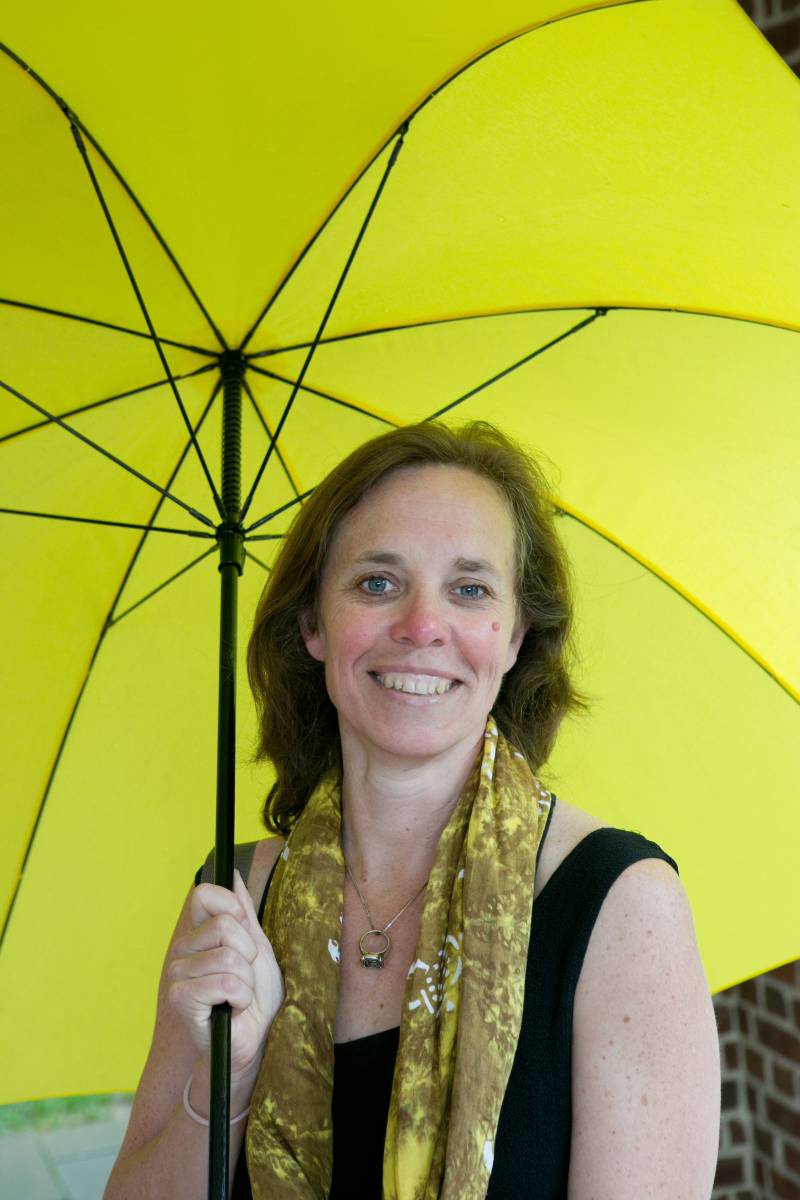
Dr. Crannell received a Fulbright Fellowship from the Fulbright U.S.Scholars program for the project titled Mathematical Perspective of Panama. Dr. Crannell will spend 9 months abroad.
Abstract
Working from a cheerful office in Panama City’s Ciudad del Saber (City of Knowledge), I am exploring applications of projective geometry to perspective art via two avenues. For the first and primary application, I am writing a book on optical illusions that rely on perspective tricks, categorizing and describing the underlying geometric structures that drive such illusions. The second explores Multiview geometry (recreating a 3D object from two or more 2D images of the object), providing a geometric framework to complement the algebraic structure that is already in use. Understanding the ways we make images, and the limitations on doing so, is vital to our making sense of our increasingly visual world. My host institution is FUNDAPROMAT, the Panamanian Foundation for the Promotion of Mathematics, and with their help I am weaving multiple outreach opportunities into the project, collaborating on programs and workshops, and availing myself of their connections with Panamanian museums and universities.
Dr. Crannell is publishing a blog about her time abroad.
Thomas Hull, Associate Professor of Applied Mathematics
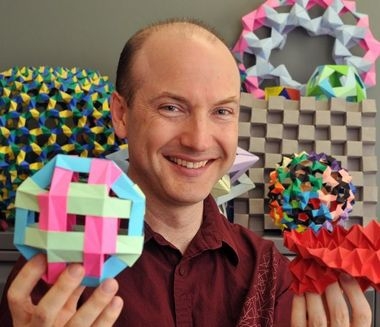
Dr. Hull received $225,148 from the National Science Foundation for the project titled Configuration of Flexible Polyhedral Surfaces.
Abstract
Imagine a 3D surface made of many metal plates joined along their sides by hinges. Could such a surface start as a large dome and be flexed into a compact shape small enough to fit into a rocket? Could the flexing of such a surface be controlled to act as part of a robotics mechanism? Answering questions like these is the goal of this project: To establish a strong connection between general 3D flexible polyhedral surfaces (which might look like a dome, with positive curvature, or a saddle, with negative curvature) and origami, which is folded from flat, zero-curvature paper. This subject has been studied heavily in recent years by engineers and physicists. Bringing mathematical tools from origami to flexible polyhedral surfaces could open up the field for practical applications in architecture, robotics, and structure designs for outer space.
Sarah Tasker, Assistant Professor, Department of Chemistry

Dr. Tasker received $514,388 from the National Science Foundation for a project titled CAREER: Development of New Gas-Releasing Molecules Using a Thiol Carrier.
Dr. Tasker also received $2,684 from the National Science Foundation for a project titled CAREER Training Conference.
Abstract
Dr. Tasker, working with faculty from the University of California at Riverside, was invited to present at a conference held in the Summer of 2024 in Arlington, Virginia, on preparing successful CAREER proposals to the National Science Foundation.
Faculty Early Career Development Program (CAREER) awards are among the most prestigious awards made by the National Science Foundation.
View a more technical description of Dr. Tasker's project. View more information on Dr. Tasker's research and her work with students.
Ryan Trainor, Associate Professor of Physics and Astronomy

Dr. Trainor received a Fulbright Fellowship from the Fulbright U.S. Scholars program for the project Measuring Cosmic Chemical Evolution with Galaxy Twins and Data Science. Dr Trainorl will spend 4 months in Chile.
Abstract
Dr. Trainor will spend four months in Chile, collaborating with Prof. Valentino Gonzalez at the University of Chile and collecting data at the Las Campanas Observatory (LCO) to study the cosmic chemical evolution of galaxies. Cosmic chemical evolution describes how galactic activity populated the early universe with all of the elements in the periodic table. Measuring this evolution is challenging because it requires precise and uniform measurements of galaxies as they are today and in the early universe. These challenges can be addressed by leveraging unique and sensitive measurements of twin galaxies separated by 10 billion years of cosmic evolution. Using data collected at LCO will allow measures of change in chemical composition and will allow the development of statistical tools to help improve future studies. Additionally, statistical tools and active learning will be used to teach an astroinformatics course at the University of Chile that explores topics at the intersection of astronomy and data science.
Get more information on Dr. Trainor's research and his work with students.
Scott Lerner, Arthur and Katherine Shadek Professor of Humanities and French and Italian
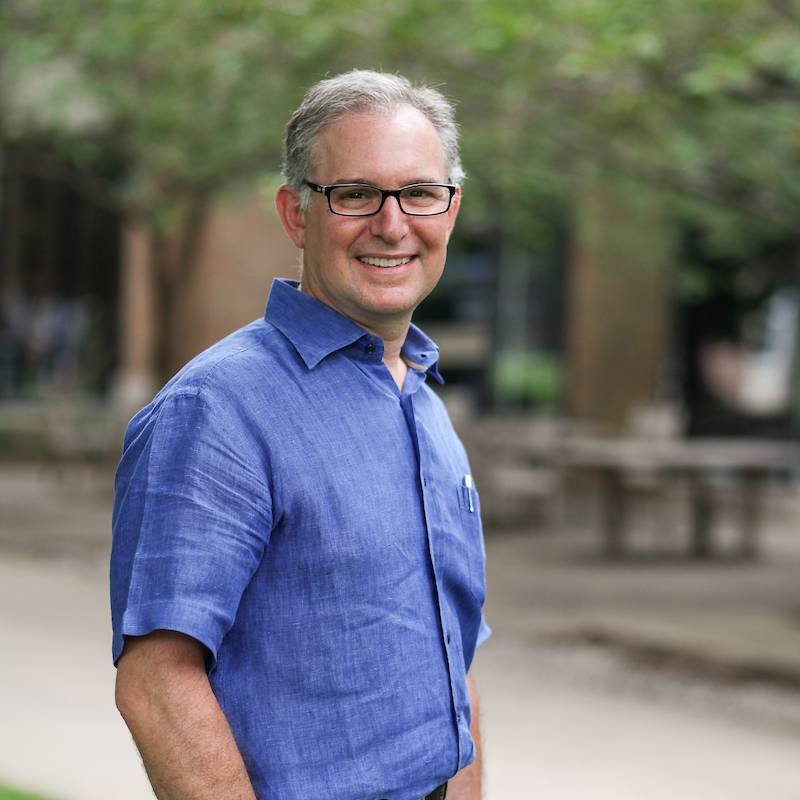
Dr. Lerner received $21,500 from the Italian Ministry of Foreign Affairs toward advancements in teaching Italian Studies.
Willie Wilson, Assistant Professor, Computer Science

Dr. Wilson received $505,358 for a project titled CAREER: Transparent Theory of Mind Algorithms for Social Robots Assisting Young Children.
Abstract
View a more complete and technical description of Dr. Wilson's project. View additional information on Dr. Wilson and his project.
Faculty Early Career Development Program (CAREER) awards are among the most prestigious awards made by the National Science Foundation.
Academic Year 2022-2023
Kate Plass, Professor, Department of Chemistry
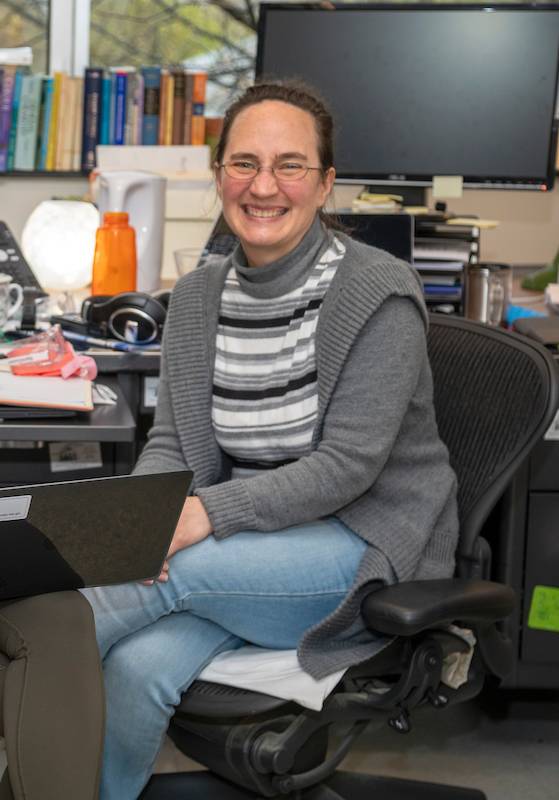
Dr. Plass was awarded $470,879 by the National Science Foundation for a project titled RUI: Post-synthetic transformations of anions in metal chalcogenide nanoparticles: Uncovering synthetic design rules and the effect on subsequent transformations.
Abstract
Nanoparticle synthesis is not as well understood as traditional chemical synthesis. While organic chemists can design new drugs, inorganic chemists can design new molecular catalysts, and biochemists can design processes like CRISPR, nanomaterials chemists are much more dependent on luck. We aim to find new ways to controllably change the chemistry and shape of particles through post-synthetic transformations. We can make copper sulfide nanorods and then trade out the sulfur component for tellurium or selenium. We seek to understand how these transformations work and how they interplay with other types of transformations. We also seek to use computational methods to model post-synthetic nanoparticle transformations. This work has a wide range of practical applications, including in things like solar energy capture and sustainable electronic devices that rely on the ability to design nanoparticles with specific properties.
View a more technical description of Dr. Plass' work.
View more information on Dr. Plass' research and work with students.
Gregory Adkins, William G. and Elizabeth R. Simeral Emeritus Professor of Physics
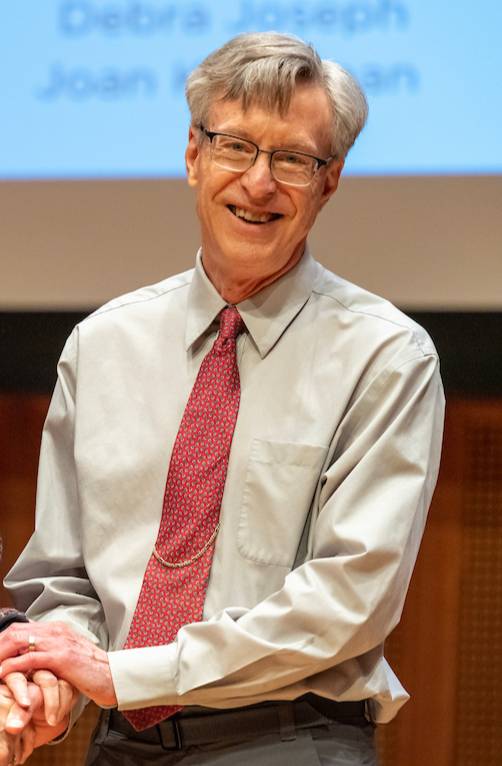
Dr. Adkins was awarded $240,000 from the National Science Foundation for a project titled RUI: Calculation of Higher Order Corrections to Positronium Energy Levels.
Abstract
Positronium is the “exotic atom” consisting of an electron and its antiparticle, the positron. Positronium is similar in many ways to traditional simple atoms such as hydrogen and helium, but is different because of its unique composition and because of its tendency to annihilate, transforming into pure electromagnetic energy in the form of high-energy photons. Positronium can be produced in the laboratory, and many of its properties, such as energy levels and lifetimes, have been measured to high precision. Positronium properties can also be calculated theoretically to high precision using the methods of bound-state Quantum Electrodynamics (QED) because strong and weak interaction effects are negligible. Consequently, positronium is an ideal system for testing the limits of QED bound state physics and for exploring the consequences of agreement or disagreement between theory and experiment at this high level of precision. Undergraduate students at Franklin & Marshall College will be involved as collaborators in this work. The students will learn theoretical methods of calculation more advanced than those usually encountered at the undergraduate level. They will gain valuable experience by doing the research, by preparing and giving presentations describing their results, and by publishing their work as co-authors in research journals.
View a more technical description of Dr. Adkins' work.
Ryan Trainor, Associate Professor of Physics
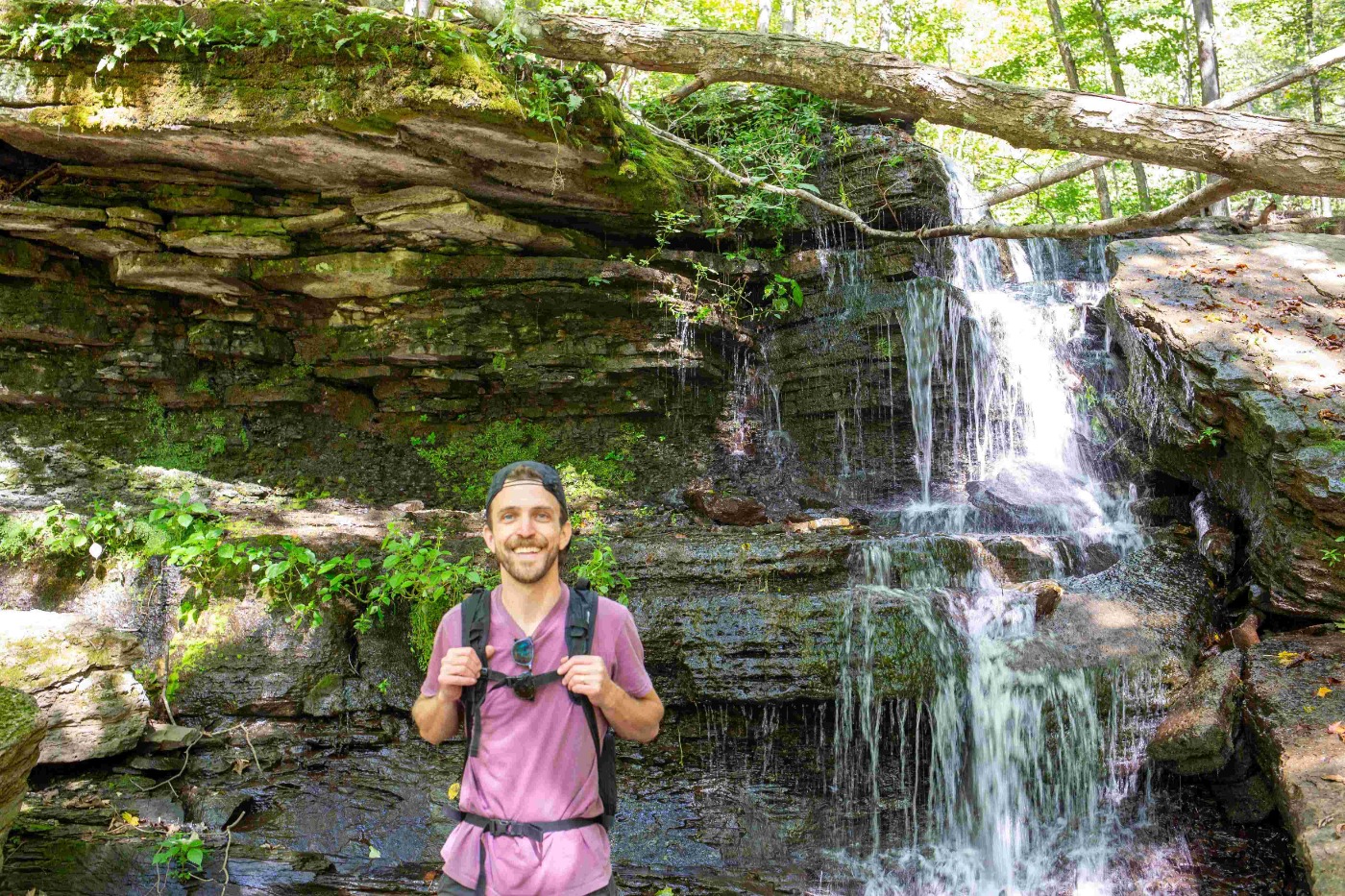
Dr. Trainor received $86,397 from the Space Science Telescope Institute (STScI) for the project titled CECILIA: A direct-method metallicity calibration for Cosmic Noon through the Epoch of Reionization.
Abstract
The STSci selects and organizes observation times on NASA's two major space telescopes, the Hubble and James Webb. The Chemical Evolution Constrained Using Ionized Lines in Interstellar Aurorae (CECELIA) project, one of the first projects selected to use observations from the James Webb Telescope after it became operational, was intended to...
View more information about Dr. Trainor, his research, and his work with students.
Jennifer Morford, Charles A. Dana Professor of Chemistry

Dr. Morford received $531,600 from the Howard Hughes Medical Institute for a project titled Processes and methods to foster institutional change toward more inclusive and equitable introductory STEM
education.
Abstract
Franklin & Marshall College (F&M) offers small class sizes, inquiry-based labs, and other best practices in STEM education; however, achievement gaps persist, and intersections between gender and racial identities affect course outcomes. As performance often predicts retention along STEM pathways, students of color tend to be less likely to continue in STEM. This proposal seeks to foster institutional change for creating and sustaining a more inclusive, supportive, and successful introductory STEM curriculum by emphasizing the importance of the three LCC1 projects: Faculty Development; Student Engagement & Agency; and Curricular Change.
Dr. Morford also received $318,711 from the National Science Foundation for a project titled RUI: Where does all the Mo go? Evaluating the role of iron sulfides in Mo accumulation in marine sediments.
Abstract
We propose to thoroughly investigate the relationship between molybdenum and iron sulfides. We have established an environmentally relevant path for the synthesis of iron sulfides, such as mackinawite and greigite. This method has enabled foundational adsorption experiments with tetrathiomolybdate (MoS42- ). The results from this work established how readily mackinawite and greigite absorb MoS42- suggesting that Mo removal occurs with the initial formation of iron sulfides. Subsequent experiments showed the retention of Mo during the transformation of these precursor phases to the thermodynamically stable form of pyrite. With this groundwork, we are now prepared to exhaustively examine the role that iron sulfides play in the accumulation of Mo in marine sediments. This clarification on the importance of iron sulfides for Mo accumulation and the concomitant factors that enhance Mo preservation in the solid phase will yield greater insight into the the value of Mo as a paleotracer for past sulfidic conditions. Our work will resolve the relative importance of iron sulfides in the accumulation of Mo in marine sediments.
Sarah Tasker, Assistant Professor of Chemistry
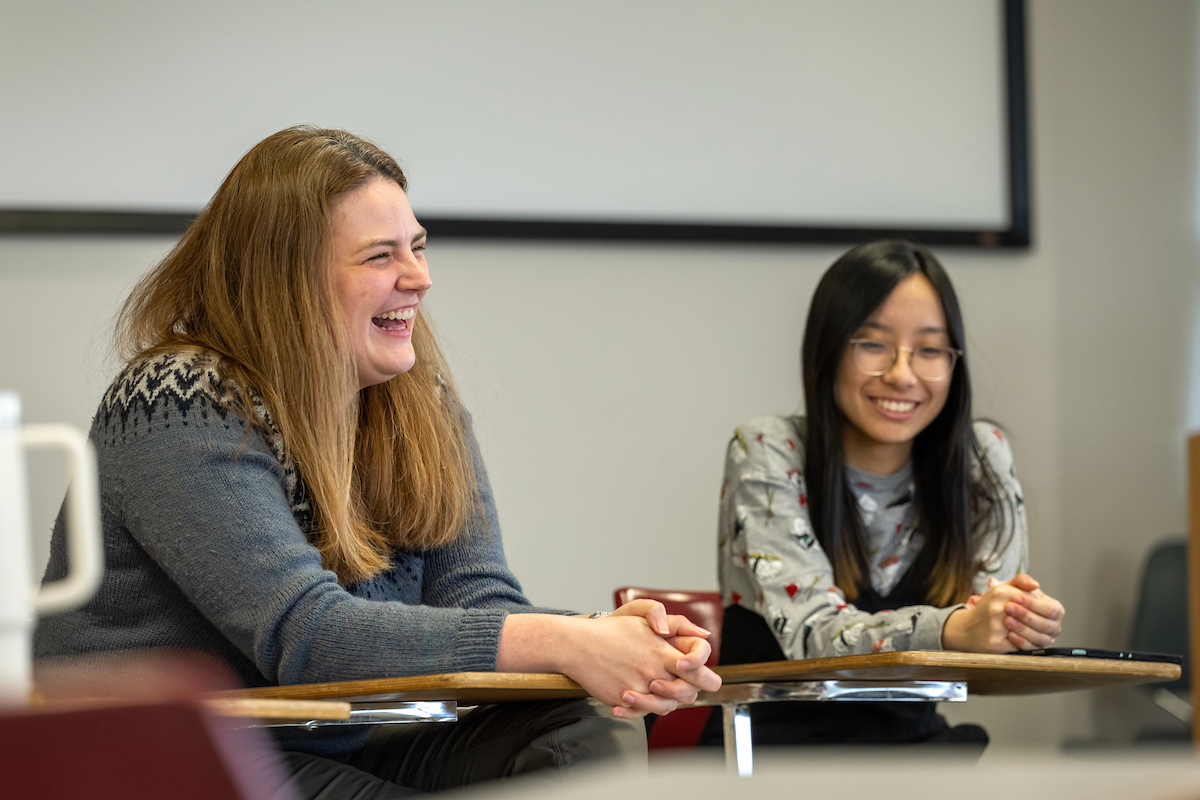
Dr. Tasker received $16,000 from the Organic Synthesis Summer Research Grant Program for a project titled Synthesis of Thioethers via Anti-Markovnikov Addition of S-Aryl Thioformates to Alkenes.
